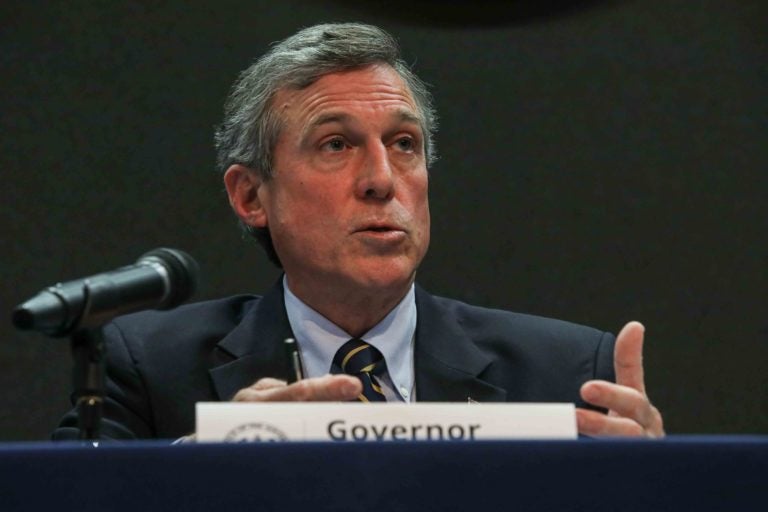Coronavirus update: Delaware postpones presidential primary again
Gov. John Carney has issued a second delay for Delaware's presidential primary, postponing it until July 7.

File photo: Delaware Gov. John Carney answers questions regarding Delaware’s response to coronavirus during a press briefing at the Carvel State Office building in Wilmington on April 3, 2020. (Saquan Stimpson for WHYY)
Are you on the front lines of the coronavirus? Help us report on the pandemic.
Another 161 cases of the coronavirus have been reported in Delaware as of Thursday afternoon. That brings the state’s total number of cases to 5,939. The increase is less than half of the more than 400 new cases reported on Wednesday.
The state saw nine more deaths for a total of 202 fatalities. The number of people being treated in Delaware hospitals fell by 14 to 285.
Another delay for Delaware presidential primary
Delaware’s presidential primary, originally scheduled for April 28, had been delayed until June 2. But Gov. John Carney issued a second delay, postponing the primary until July 7.
“Delawareans have a basic, fundamental right to vote, and these changes will allow all Delaware voters to safely exercise that right,” Carney said. “We are making progress. Delawareans have helped flatten the curve by staying home, and by practicing social distancing when you’re out in public. But this fight isn’t over.”
As part of that move, the Dept. of Elections will mail every resident an absentee ballot to vote in the primary. Eligible voters will be permitted to select the “sick” or “temporarily or permanently physically disabled” options on the absentee ballot application to vote in the primary even if they are not exhibiting symptoms of COVID-19.
At least six polling places in each county will be open on July 7 for voters who choose not to vote by absentee ballot.
Fees return to Delaware parks
Delaware state parks have been among the few locations that have remained open for residents in quarantine to explore. Since the start of Carney’s stay-at-home order in mid-March, those parks have not collected fees.
But starting Friday, visitors will have to pay entry fees at parks statewide.
The change comes on the same day that some small Delaware businesses will be able to reopen on a limited basis, with curbside pick up available at clothing stores, sporting good retailers and tobacco shops.
“As the state’s businesses take small steps toward reopening on Friday, we will start our delayed fee season for parks as well, since 65% of the funding that runs our state parks system comes from visitor fees,” said Shawn Garvin, secretary of the Delaware Department of Natural Resources and Environmental Control.
Workers won’t be collecting fees at the park entrance booths, so visitors can pay via automated credit card machines or via self-pay envelopes. Park bathrooms will remain closed, along with playgrounds, campgrounds and park offices. Visitors are still required to carry masks that must be worn when in close proximity to other people.
State park entrance fees for vehicles registered in Delaware are $4 at inland parks and $5 at ocean parks. Fees for out-of-state vehicles are $8 at inland parks and $10 at ocean parks. Entrance fees will remain in effect through Nov. 30, which is the normal fee season end date.
For the first time ever, state parks will offer its Assistance Pass Program to workers who are unemployed. That program provides an annual pass discount for residents receiving Medicaid and Social Security Supplemental Security Income, as well as those under the Supplemental Nutrition Assistance Program and Special Supplemental Nutrition Program for Women, Infant and Children.
Teachers, parents say Wi-Fi, broadband access among top needs
Improved access to the internet via Wi-Fi or highspeed broadband connection tops the list of needs for educators and students. That’s the result of a poll of 859 teachers, parents and other education leaders by the Rodel Foundation of Delaware.
In Delaware, 17% of households don’t have access to the internet at home and 9% don’t have access to a computer, smartphone or tablet, the report said.
“If we do not act aggressively, the ‘gaps’ in opportunity for our most vulnerable young people will become chasms. We risk losing a generation of young people if we don’t collectively listen and respond to the needs of our communities and educators,” said Paul Herdman, Rodel president and CEO.
Other priorities highlighted in the polling include guidance and support to meet special learning needs for students, including Individualized Education Program (IEPs) and translation services for non-English speaking families.
Longer-term concerns for teachers and parents include how to evaluate the extent of learning loss students will have experienced. If schools restart in the fall, some students will have gone nearly six months without in-person classroom instruction.
WHYY is your source for fact-based, in-depth journalism and information. As a nonprofit organization, we rely on financial support from readers like you. Please give today.




![CoronavirusPandemic_1024x512[1]](https://whyy.org/wp-content/uploads/2020/03/CoronavirusPandemic_1024x5121-300x150.jpg)



